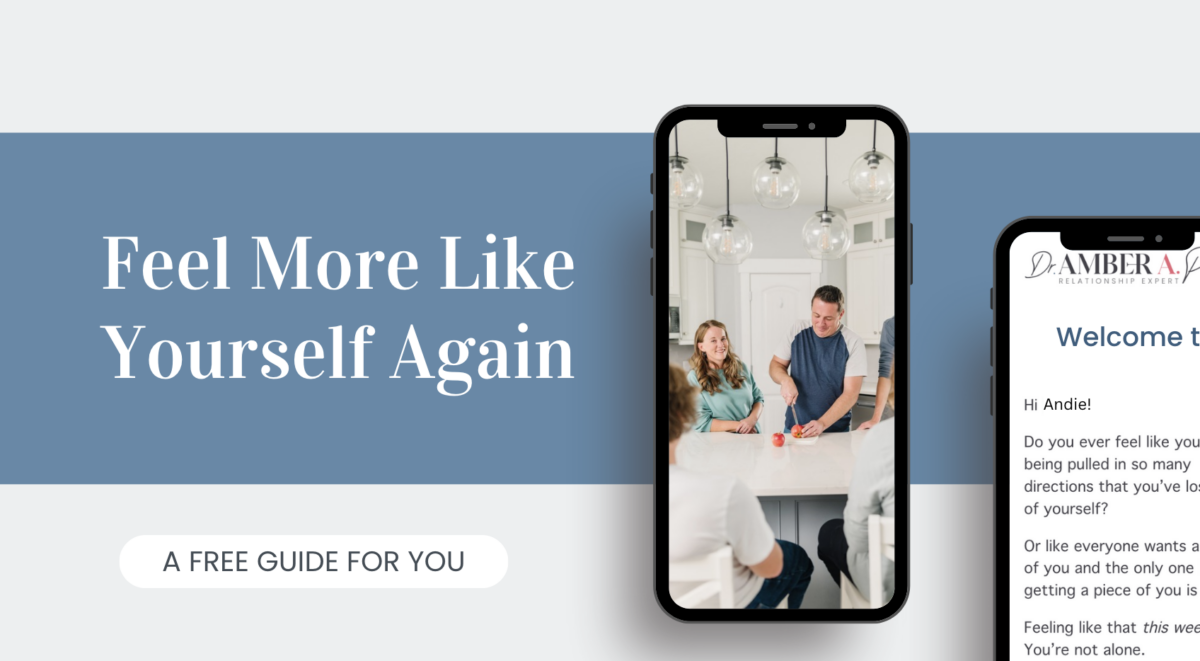
Like Listening?
Pop in those earbuds & listen to learn more about feeling like you’re enough on the Relate-Able Podcast
Poor Ken. Nobody even knows who he is if his name isn’t attached to Barbie’s. There’s no movie all about him. Nobody developed a whole line of toys around him. He’s just Ken. The sidekick half of Barbie and Ken.
But there are lessons to be learned from Ken. Two big important lessons that the movie brought to the forefront, and they really matter for you and me. This poor, half-forgotten man has something super important to teach us.
So, let’s have some fun with this and talk about what we can learn from Ken, OK?
If you haven’t seen the Barbie movie, never fear. Ken’s part of the story is pretty straightforward. He’s Barbie’s boyfriend, you see, and so he does the things that boyfriends do. He calls her. He comes over to her house. He tries to protect her and do “manly” things.

And Barbie tolerates it, but it’s clear she’s just not that into him.
After Barbie gains a stronger sense of who she is and what she wants (which is an article for another day, we’re trying to keep the spotlight on poor forgotten Ken here), she finally lets Ken know that it’s just not going to work out between them.
And he’s devastated. And doesn’t really understand what she’s saying. How could he NOT be part of the Barbie and Ken duo? How could SHE not be part of the Barbie and Ken duo? That’s who he is. That’s who they are.
I admit, my jaw was hanging open a little when I saw the movie and watched these important lessons play out on the big screen. For years, I’ve researched and taught these ideas, and here they were portrayed in a fun and relatable way.
Lesson From Ken #1: You Are Not Just an AND
It’s hard for Ken to separate himself from Barbie because he’s built his entire identity around being Barbie’s boyfriend. Without that piece of identity, who even is he? He’s got no idea. He’s dedicated all his time and energy to this identity and now that she’s taking that away, he’s left floundering.
It seems sad, right? The poor guy has just had the rug pulled out from under him and now he’s got to do some redefining of who he really is. I can’t imagine how hard that would be…
Or wait, can I? (Can you?)
Because the truth is that it’s really easy to do this in our lives—to tie our entire identity to a relationship and to have no real idea of who we are, outside of that role.
Moms do this all the time. They love being moms and it’s even kind of fun to be known as “Jack’s mom” to cute little people in the preschool. The day-to-day tasks of motherhood easily provide an identity to rely on. “I’m a mom. I take care of kids and that means that I wipe noses and give snuggles and help with homework and do all the things that moms do. That’s who I am.” Not a bad gig and at least the identity part of it is straightforward.

Shaping your identity around a relationship can happen in marriage or other romantic relationships too, even when it doesn’t seem as blatant as it might with Ken. Cue Emily Gilmore (where my Gilmore Girls fans at) as she cries “For two-thirds of my life, I have been the wife of Richard Gilmore. I run his household, I plan his meals, I buy his clothes, I entertain his business associates. When he loses his reading glasses, I find them. When he wants a nightcap, I make it for him. If he can’t remember the name of a colleague’s wife, I whisper it in his ear. That’s what I do. I take care of him. That’s my job. That’s who I am.”
It’s not a bad thing that Emily wants to do nice things for her husband. That’s an important part of being a spouse, so in some ways, it’s actually really great! The problem is that she defines herself by these things. As if her entire identity and worth come from this role. And as she makes clear, she has no idea who she is without him there.
This merged identity can happen in friendship too. I’ve fallen prey to this myself—tied myself so closely to a friendship that even when it started to feel a little toxic, I couldn’t end it because who would I be without it? Yikes! And a surprising number of women have told me that they’ve had similar experiences to mine.
The point is, it’s very easy to define ourselves by our relationships or the roles we play in them. Not one of those roles or relationships is a bad thing. It’s fantastic to be a loving and caring mother, wife, or friend (or sister or daughter or any other relationship).
The problem is that sometimes we let who we are be swallowed up in that role. We stop developing who we are, and we rely on the other person to maintain our sense of self for us. This is called codependency and it’s a major killer of real connection in relationships.
Look at Ken. He took no time to figure out who he is or to develop his own personality. Instead, he relied on Barbie to provide an identity and personality for him. That’s not super attractive and it makes connection really hard. If he hasn’t developed who he is, who is she even connecting with?
This kind of emotional fusion happens for you and me too. Unfortunately, it limits our ability to grow and develop the talents that are possible for us and leaves us completely tied up in being who we think we are supposed to be in the context of the relationship. And craving approval in that role.
Which leads nicely into lesson #2 from Ken.
Lesson #2 from Ken: You Can’t Be “Kenough” if You Need Others to Make You Feel That Way
After Barbie leaves him hanging, Ken ultimately moves into a place where he boldly declares that he’s “Kenough.” You know, he’s Ken, and he’s enough just how he is. A great message! One that’s being printed on real-life sweatshirts to match Ken’s so that we can each remember that we too are “Kenough.”

It’s true. You are enough.
BUT—here’s where this can go so wrong. So much of our sense of feeling like we are enough, especially for those of us with a tendency towards codependency (which is, by the way, pretty much all of us), is based on what other people think of us. We are absolutely determined to prove to others that we are enough or to manipulate them into making us feel this way.
I will feel like I am enough if I weigh the right amount or can just lose those pesky ten pounds.
I will feel like I am enough if I am productive and get a lot done during my day.
I will feel like enough if I get a good grade on that test, a raise at work, praise from my mom.
I will feel like enough if the teacher tells me my kid is behaving well or if he scores a goal in his soccer game.
I will feel like enough if I keep the house clean and get dinner on the table at a certain time.
I will feel like enough if my spouse is happy with me and makes me feel like a “good wife.”
Can you see how all of this is tied to trying to live up to the standards that you think the rest of the world has for you? Like if you can just do these things, then you can believe you are enough because others will see the goodness in you. Or like you feel good about yourself when other people validate you.
If you are trying to prove to others that you are enough, you will never succeed, no matter how cute the tie-dyed “Kenough” sweatshirt you are sporting is. This knowledge has to come from within you, not from other people. Because let’s be honest—you will never please everyone in your life. It’s impossible.
That’s why it’s so crucial that you act with integrity, in ways that feel right for you. Not because other people want you to behave that way, but because you’ve taken time to genuinely consider for yourself who you are and what matters to you, and then to act that way.
Ken is a prime example of relying on other people for a sense of identity and for positive feelings about ourselves. And those choices leave him floundering.
Is it possible that you are doing this too? Can you think of examples of how this is happening in your life? Watch yourself today and see if you notice ways that you seek approval from others in order to feel good about yourself. Consider ways that you might be diminishing your own ability to develop yourself because you’re allowing a relationship with someone else to define who you are. As you challenge these things and begin to strengthen your sense of self, get ready to find better connections with others and genuine and lasting confidence in who you are. Thank you, Ken, for these important lessons.

Join the Reclaim Yourself Progam
A transformational 9-week program designed to help you reclaim your confidence in who you are, your sense of purpose in the things you do, & your connection with the people you love
Learn More About This Program Here:
Fulfilling Connection with Yourself & Others








